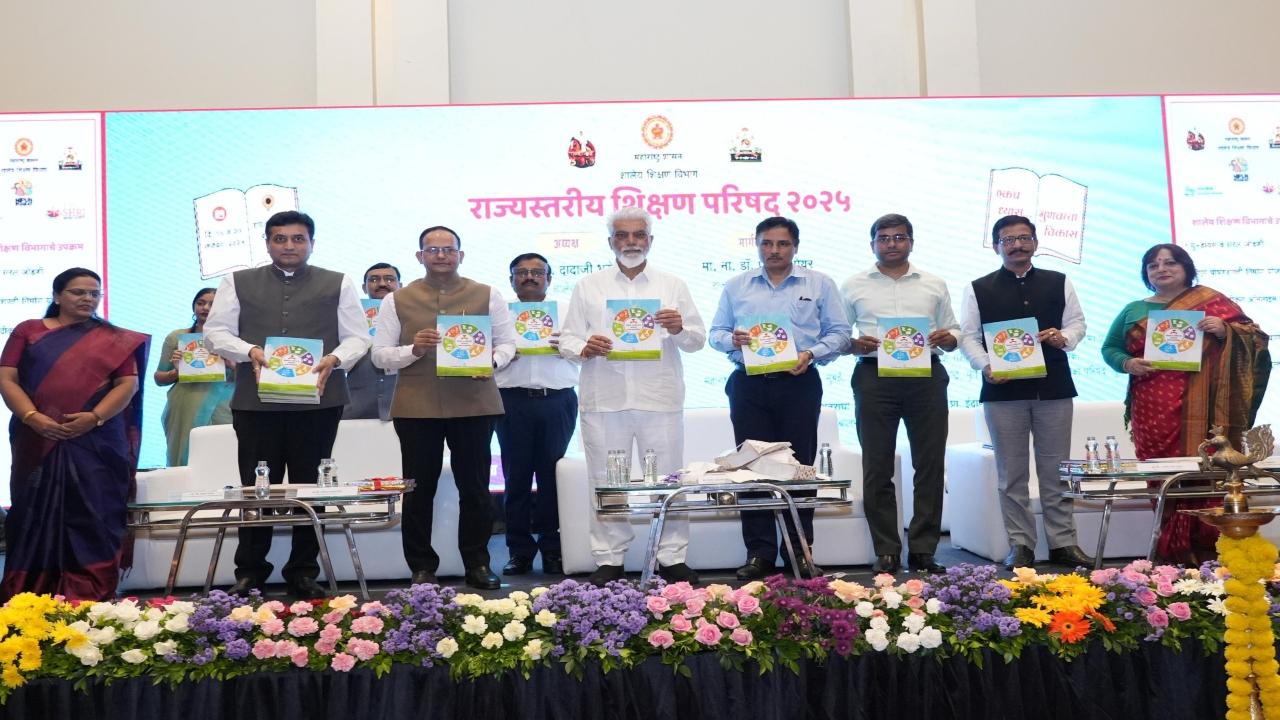**Maharashtra Announces Incentive Prizes for Excellence in Education Initiatives**
School Education Minister Shri Dadaji Bhuse announced on Friday that Zilla Parishads and Municipal Corporations excelling in promoting quality and innovative education initiatives in Maharashtra will be awarded incentive prizes. The awards include Rs 5 crore for first place, Rs 3 crore for second place, and Rs 2 crore for the third position.
The announcement was made during the inauguration of the two-day State-Level School Education Conference held in Balewadi, Pune. The event was attended by key officials including School Department Principal Secretary Ranjit Singh Deol, Education Commissioner Sachindra Pratap Singh, Maharashtra Primary Education Council State Project Director Sanjay Yadav, State Educational Research and Training Council Director Rahul Rekhawar, State Examination Council Director Nandkumar Bedse, and other directors and education officers from across the state.
Addressing the gathering, Minister Bhuse emphasized that education must be enjoyable, of high quality, comprehensive, and rooted in national values. He urged the department to implement innovative initiatives to position Maharashtra as a leader in education. Highlighting the importance of artificial intelligence, technology integration, infrastructure development, and flagship schemes like the Pradhan Mantri Poshan Shakti Yojana, scholarship examinations, and the Nipun Bharat Abhiyan, Bhuse called for a holistic approach to education enhancement.
The minister further underscored the value of experiential learning through educational trips. He suggested organizing visits to historical sites, agricultural activities, and banks to enrich students’ learning experiences.
In addition, Bhuse announced the organization of an elocution competition commemorating the 300th birth anniversary of Lokmata Punyashloka Ahilyadevi Holkar, and a quiz contest marking the 150th birth anniversary of tribal leader Birsa Munda.
**Administrative Reforms and Scholarship Exams Resumption**
Announcing administrative reforms, the minister revealed that the existing 15 school-level committees will be consolidated into four committees to enhance operational efficiency. He also confirmed the resumption of scholarship examinations for Classes 4 and 7 starting from the next academic year.
Principal Secretary Ranjit Singh Deol stressed the importance of local self-government bodies prioritizing education and health. He urged municipal commissioners to ensure effective implementation of government initiatives at the grassroots level.
Education Commissioner Sachindra Pratap Singh spoke about improving the quality of education, the implementation goals of the National Education Policy (NEP), targets set under the Nipun Bharat Abhiyan for 2027, and various ongoing school-level initiatives.
**Launch of Competition Guide and Conference Highlights**
During the ceremony, Minister Bhuse released the Teacher and Officer-Employee Competition Guide, which features 36 competitions and six Olympiads. The guide was prepared under the guidance of Rahul Rekhawar.
The conference included discussions on several critical topics such as the New Education Policy 2020, the PARAKH assessment survey report measuring learning outcomes, administrative reforms, and holistic education strategies.
Officials from different districts presented innovative educational practices implemented locally and were honored by the minister with mementos and books.
Additionally, administrative matters including Class 11 admissions, the Group School Scheme for inclusive education, the Unified District Information System for Education (UDISE) Plus database, and teacher recruitment approvals were deliberated.
Programs and schemes from the Maharashtra Primary Education Council, NEP 2020 action plans, competency-based question banks, e-Vidya educational channels, and yoga curriculum guides were also highlighted for effective execution.
**Upcoming Initiatives and Events**
Minister Bhuse directed schools across the state to organize annual gatherings, student sports competitions, and patriotic drills scheduled for January 26, 2026. He also announced an increase in prize money for science exhibitions, aiming to further encourage student participation and innovation.
—
The State-Level School Education Conference marks a significant step toward elevating educational standards in Maharashtra through strategic reforms, incentivizing innovation, and fostering community involvement in education.
https://www.mid-day.com/news/india-news/article/maharashtra-announces-incentives-for-best-performing-zilla-parishads-municipal-corporations-in-education-23594869
